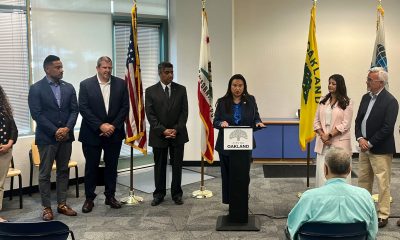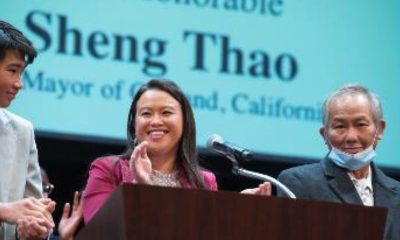Commentary
Posing as a Sports Project – Commentary

One of America’s richest men and an avid Trump supporter, billionaire John Fisher, wants to build 3,000 luxury housing units on the most valuable piece of public land in Oakland, the A’s stadium project, but his proposal has a lot more to do with real estate profits than it does with baseball.
Fisher wants to use the land for condominiums, hotel, and retail development along with a stadium for the A’s. There is much opposition among Oaklanders, and it centers on two problems.
First, the Port of Oakland, where the stadium project is located, is the reason that Oakland is in a better position economically than the old industrial cities of the Midwest. The Port generates 70,000 stable local jobs which, unlike factory jobs, cannot be moved to another country. And because of the historic politics of the local longshore union, many of those good-paying jobs are held by Black workers. Oakland cannot afford to limit its industrial engine because a developer can make a bigger profit from putting high-end condos in the same neighborhood. Furthermore, the new jobs promised by stadium advocates will either be temporary (construction) or low-wage (vendors, clerks and so on).
The demands of wealthy residents, who would inhabit the Fisher project condos, will ultimately overpower the needs of Port industry which can be noisy and dirty 24 hours a day. Decades of urban development have taught us that industrial and residential uses do not mix in the same neighborhood and industry inevitably loses out.
Second, Oakland already has a stadium. It’s in East Oakland, and Oakland families lost their homes to eminent domain fifty years ago when it was built. The Coliseum can be used as it is or it can be redeveloped. That’s what Oaklanders want, as indicated by several polls, and it is, after all, our city.
In answer to this opposition, the Oakland Council mandated a “community benefits” process, meaning that representatives from various groups get together and create a list of things residents might want in exchange for letting Fisher take over their land and build his project. Those serving in this capacity are to be much appreciated.
We do need to consider, however, what is the worth of “community benefits” when, in exchange, we may see maritime job loss, the further gentrification of West Oakland, economic harm to East Oakland, huge increases in traffic and pollution, and the creation of 3,000 housing units that nobody in Oakland can afford to live in. What “benefits” could possibly make up for those losses?
Other cities have done community benefits agreements on projects. Many of those were failures; the items negotiated with the community never happened. The One Hill Project in Pittsburgh and the Atlantic Yards-Pacific Park project in Brooklyn are two examples.
The City Council should vote to a) allow the use of the East Oakland Coliseum land to billionaire Fisher on condition that he actually built a stadium there – not sell his development rights to someone else, and b) reject Fisher’s proposal to take over the Port of Oakland land to build a playground for the rich.
The best thing for us, as a multi-racial working-class city, is 1) To keep the Port humming without Fisher’s interference, while making environmental and equity improvements in Port operations; 2) Refurbish the Coliseum in East Oakland; and 3) Ask some of our Democratic politicians to end their flirtation with major Trump supporter, John Fisher.
Kitty Kelly Epstein, PhD is a professor of education and urban studies, an Oakland resident, the host of Education Today on KPFA; and the author of four books, including her latest “Changing Academia Forever” (2020)
Commentary
Opinion: Lessons for Current Student Protesters From a San Francisco State Strike Veteran
How the nation’s first College of Ethnic studies came about, bringing together Latino, African American and Asian American disciplines may offer some clues as to how to ease the current turmoil on American college campuses over the Israel-Hamas war. After the deadline passed to end the Columbia University encampment by 2 p.m. Monday, student protesters blockaded and occupied Hamilton Hall in a symbolic move early Tuesday morning. Protesters did the same in 1968.

By Emil Guillermo
How the nation’s first College of Ethnic studies came about, bringing together Latino, African American and Asian American disciplines may offer some clues as to how to ease the current turmoil on American college campuses over the Israel-Hamas war.
After the deadline passed to end the Columbia University encampment by 2 p.m. Monday, student protesters blockaded and occupied Hamilton Hall in a symbolic move early Tuesday morning.
Protesters did the same in 1968.
That made me think of San Francisco State University, 1968.
The news was filled with call backs to practically every student protest in the past six decades as arrests mounted into hundreds on nearly two dozen campuses around the country.
In 1970, the protests at Kent State were over the Vietnam War. Ohio National Guardsmen came in, opened fire, and killed four students.
Less than two weeks later that year, civil rights activists outside a dormitory at Jackson State were confronted by armed police. Two African American students were killed, twelve injured.
But again, I didn’t hear anyone mention San Francisco State University, 1968.
That protest addressed all the issues of the day and more. The student strike at SFSU was against the Vietnam war.
That final goal was eventually achieved, but there was violence, sparked mostly by “outside agitators,” who were confronted by police.
“People used the term ‘off the pigs’ but it was more rally rhetoric than a call to action (to actually kill police),” said Daniel Phil Gonzales, who was one of the strikers in 1968.
Gonzales, known as the go-to resource among Filipino American scholars for decades, went on to teach at what was the positive outcome of the strike, San Francisco State University’s College of Ethnic Studies. It’s believed to be the first of its kind in the nation. Gonzales recently retired after more than 50 years as professor.
As for today’s protests, Gonzales is dismayed that the students have constantly dealt with charges of antisemitism.
“It stymies conversation and encourages further polarization and the possibility of violent confrontation,” he said. “You’re going to be labeled pro-Hamas or pro-terrorist.”
That’s happening now. But we forget we are dealing not with Hamas proxies. We are dealing with students.
Gonzales said that was a key lesson at SF State’s strike. The main coalition driving the strike was aided by self-policing from inside of the movement. “That’s very difficult to maintain. Once you start this kind of activity, you don’t know who’s going to join,” he said.
Gonzales believes that in the current situation, there is a patch of humanity, common ground, where one can be both pro-Palestine and pro-Israel. He said it’s made difficult if you stand against the belligerent policies of Benjamin Netanyahu. In that case, you’re likely to be labeled antisemitic.
Despite that, Gonzales is in solidarity with the protesters and the people of Gaza, generally. Not Hamas. And he sees how most of the young people protesting are in shock at what he called the “duration of the absolute inhumane kind of persecution and prosecution of the Palestinians carried out by the Israeli government.”
As a survivor of campus protest decades ago, Gonzales offered some advice to the student protesters of 2024.
“You have to have a definable goal, but right now the path to that goal is unclear,” he said.
About the Author
Emil Guillermo is a journalist and commentator. A veteran newsman in TV and print, he is a former host of NPR’s “All Things Considered.”
Activism
Oakland Post: Week of May 1 – 7, 2024
The printed Weekly Edition of the Oakland Post: Week of May 1 – 7, 2024

To enlarge your view of this issue, use the slider, magnifying glass icon or full page icon in the lower right corner of the browser window. ![]()
Activism
Oakland Post: Week of April 24 – 30, 2024
The printed Weekly Edition of the Oakland Post: Week of April 24 – 30, 2024

To enlarge your view of this issue, use the slider, magnifying glass icon or full page icon in the lower right corner of the browser window. ![]()
-

 Community3 weeks ago
Community3 weeks agoFinancial Assistance Bill for Descendants of Enslaved Persons to Help Them Purchase, Own, or Maintain a Home
-

 Business3 weeks ago
Business3 weeks agoV.P. Kamala Harris: Americans With Criminal Records Will Soon Be Eligible for SBA Loans
-

 Activism4 weeks ago
Activism4 weeks agoOakland Post: Week of April 10 – 16, 2024
-

 City Government4 days ago
City Government4 days agoCourt Throws Out Law That Allowed Californians to Build Duplexes, Triplexes and RDUs on Their Properties
-

 Community3 weeks ago
Community3 weeks agoAG Bonta Says Oakland School Leaders Should Comply with State Laws to Avoid ‘Disparate Harm’ When Closing or Merging Schools
-

 Activism2 weeks ago
Activism2 weeks agoOakland Post: Week of April 24 – 30, 2024
-

 Community2 weeks ago
Community2 weeks agoRichmond Nonprofit Helps Ex-Felons Get Back on Their Feet
-

 Community3 weeks ago
Community3 weeks agoOakland WNBA Player to be Inducted Into Hall of Fame























































